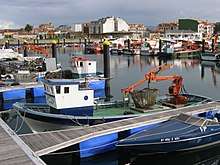guindastre
Galician

Guindastre aboard a fishing boar
An old cooking guindastre, used for hanging a pot over the fire
Alternative forms
Etymology
15th century. Probably from Old Northern French, from Old Norse vinda (“to wind”) + ass (“pole”), from Proto-Germanic *windaną (“to wind”) + *astaz (“branch”). Cognate with Icelandic vindilass and English windlass.[1]
Pronunciation
- IPA(key): /ɡinˈdastɾe̝/
Noun
guindastre m (plural guindastres)
- windlass; winch
- 1418, Ángel Rodríguez González (ed.), Libro do Concello de Santiago:
- destes por duas palmelas et dous golfoos et cravos para o gindastes dose moravedis
- you gave for two hinges and for nails for the windlass 12 coins
- destes por duas palmelas et dous golfoos et cravos para o gindastes dose moravedis
- 1973, Xosé Gayoso, Coa nosa xente, Vigo: Galaxia:
- o caldeiro é grande e negro, e colga dun guindastre (unha viga que xirando pon o caldeiro sobor do lume)
- the cauldron is large and black, and it hangs from a windlass (a pole which, upon winding, can set the cauldron over the fire)
- o caldeiro é grande e negro, e colga dun guindastre (unha viga que xirando pon o caldeiro sobor do lume)
- 1418, Ángel Rodríguez González (ed.), Libro do Concello de Santiago:
- crane (machine)
Related terms
References
- “gindaste” in Xavier Varela Barreiro & Xavier Gómez Guinovart: Corpus Xelmírez - Corpus lingüístico da Galicia medieval. SLI / Grupo TALG / ILG, 2006-2016.
- “guindastre” in Dicionario de Dicionarios da lingua galega, SLI - ILGA 2006-2013.
- “guindastre” in Tesouro informatizado da lingua galega. Santiago: ILG.
- “guindastre” in Álvarez, Rosario (coord.): Tesouro do léxico patrimonial galego e portugués, Santiago de Compostela: Instituto da Lingua Galega.
- Coromines, Joan; Pascual, José A. (1991–1997). Diccionario crítico etimológico castellano e hispánico. Madrid: Gredos, s.v. guindar.
This article is issued from
Wiktionary.
The text is licensed under Creative
Commons - Attribution - Sharealike.
Additional terms may apply for the media files.